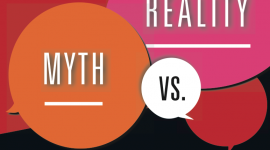Bipolar Disorder Myths: Separating Fact from Fiction

Bipolar disorder myths still exist, even though our collective understanding of mental illness has improved. Whether it's that article you read online or a disparaging remark from someone you know, it's all too easy to spread misinformation about important topics nowadays. However, if you have just been diagnosed with bipolar disorder or you know someone who has, buying into these misconceptions can be damaging, so it's important to separate fact from fiction. With this in mind, here are some myths about bipolar disorder and the truths that dispel them.
Bipolar Disorder Myths and Facts
Bipolar disorder myths can be damaging to people living with this condition. Managing bipolar disorder is an ongoing challenge, and misinformation can contribute to bipolar stigma and a lack of understanding from others. Here are some common bipolar disorder myths that need dismantling.
Bipolar Myth: People with bipolar disorder are crazy
The fact is, bipolar disorder is an illness. It’s not something you choose, and you cannot help it. People develop bipolar disorder for a variety of reasons, including genetic factors, imbalances in brain chemicals, hormones and environmental stressors.
Having bipolar disorder does not make you crazy. This is a derogatory term that is often wielded with no regard for its meaning. Many people who have bipolar disorder live healthy, happy lives when they are not experiencing episodes, and others find that bipolar medication improves their symptoms.
Bipolar Myth: Bipolar medications turn you into a zombie
This is an outdated belief that does not ring true for most people. In fact, the majority of people find that they function better while taking medication and that many of their bipolar symptoms are markedly diminished.
Of course, bipolar medications can, and often do, have side-effects. Mood stabilizers can make some people feel tired and sluggish. These side-effects of mood stabilizers can easily be addressed by your doctor, who can lower or adjust your dose so that you feel better.
Bipolar Myth: There is just one type of bipolar disorder
Bipolar disorder isn’t the same for everyone. Like many mental disorders, it exists on a spectrum, and treatments vary according to which type of bipolar disorder a person has.
The three most common forms of bipolar disorder are:
- Bipolar I disorder: Characterized by the existence of at least one episode of full mania
- Bipolar II disorder: Defined by frequent periods of major depression and less frequent episodes of hypomania (a less severe form of mania that lasts for around four days at a time)
- Cyclothymic disorder: A mild mood disorder in which the symptoms of depression and mania/hypomania do not fit the criteria for either bipolar I or bipolar II.
Bipolar Myth: Treatment for bipolar disorder doesn’t work
It is a myth that bipolar disorder treatments don’t work, and most people find that a combination of medication, psychological therapy and changes to their lifestyle help them to manage the symptoms of bipolar. Bipolar disorder is not curable, and some people “relapse” into symptoms during times of stress. Others, however, have sustained periods where they experience little to no symptoms at all.
Crucially, it is nobody’s fault if you continue to have symptoms despite treatment, so it’s important not to place blame. There are always ways to improve treatment, but it can take months or even years to find a route to recovery that works for you.
Bipolar Myths and Facts: Why It’s Important to Know the Difference
It’s important to know the difference between bipolar myths and facts so that you have an accurate picture of what living with this disorder is actually like. If you are newly diagnosed, or you know someone with bipolar disorder, there are plenty of scaremongering stories to be found that can make you think the worst. These stories should be read with caution, and you’re best off sticking to factual sources – at least until you feel more at ease with your diagnosis.
This is not to say that someone else's experience of bipolar disorder isn't real, or that it is somehow invalid – it's just not the whole truth, and it's not necessarily your truth. Bipolar disorder takes many forms and presents slightly differently in everyone.
In reality, bipolar disorder is one of the easiest mental illnesses to treat because it has such strict diagnostic criteria. For most people, the challenging part is getting a proper diagnosis, so you may already have jumped the biggest hurdle.
APA Reference
Smith, E.
(2021, December 28). Bipolar Disorder Myths: Separating Fact from Fiction, HealthyPlace. Retrieved
on 2026, January 19 from https://www.healthyplace.com/bipolar-disorder/bipolar-information/bipolar-disorder-myths-separating-fact-from-fiction



